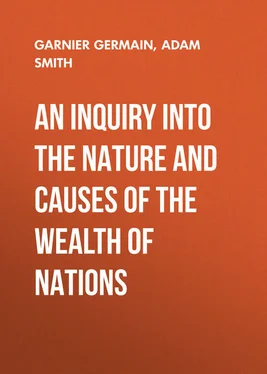Germain Garnier - An Inquiry Into the Nature and Causes of the Wealth of Nations
Здесь есть возможность читать онлайн «Germain Garnier - An Inquiry Into the Nature and Causes of the Wealth of Nations» — ознакомительный отрывок электронной книги совершенно бесплатно, а после прочтения отрывка купить полную версию. В некоторых случаях можно слушать аудио, скачать через торрент в формате fb2 и присутствует краткое содержание. Жанр: economics, foreign_antique, foreign_prose, foreign_business, на английском языке. Описание произведения, (предисловие) а так же отзывы посетителей доступны на портале библиотеки ЛибКат.
- Название:An Inquiry Into the Nature and Causes of the Wealth of Nations
- Автор:
- Жанр:
- Год:неизвестен
- ISBN:нет данных
- Рейтинг книги:5 / 5. Голосов: 1
-
Избранное:Добавить в избранное
- Отзывы:
-
Ваша оценка:
- 100
- 1
- 2
- 3
- 4
- 5
An Inquiry Into the Nature and Causes of the Wealth of Nations: краткое содержание, описание и аннотация
Предлагаем к чтению аннотацию, описание, краткое содержание или предисловие (зависит от того, что написал сам автор книги «An Inquiry Into the Nature and Causes of the Wealth of Nations»). Если вы не нашли необходимую информацию о книге — напишите в комментариях, мы постараемся отыскать её.
An Inquiry Into the Nature and Causes of the Wealth of Nations — читать онлайн ознакомительный отрывок
Ниже представлен текст книги, разбитый по страницам. Система сохранения места последней прочитанной страницы, позволяет с удобством читать онлайн бесплатно книгу «An Inquiry Into the Nature and Causes of the Wealth of Nations», без необходимости каждый раз заново искать на чём Вы остановились. Поставьте закладку, и сможете в любой момент перейти на страницу, на которой закончили чтение.
Интервал:
Закладка:
Not long before the death of Smith, finding his end approach rapidly, he gave orders to destroy all his manuscripts, excepting some detached essays, which he entrusted to the care of his executors. With the exception of these essays, all his papers were committed to the flames. What were the particular contents of these papers was not known, even to his most intimate friends. The additions to the Theory of Moral Sentiments, most of which were composed under severe illness, had fortunately been sent to the press in the beginning of the preceding winter; and the author lived to see the publication of this new edition. 4 4 It may not be uninteresting to mention what has been said of the manner in which the writings of Mr. Smith were composed. – 'Mr. Smith observed to me, not long before his death,' says Mr. Stewart, 'that after all his practice in writing, he composed as slowly, and with as great difficulty as at first.' He added, at the same time, that Mr. Hume had acquired so great a facility in this respect, that the last volume of his History was printed from the original copy, with a few marginal corrections. Mr. Smith, when be was employed in composition, generally walked up and down his apartment, dictating to a secretary. All Mr. Hume's works, it has been said, were written with his own hand.
Some time before his last illness, when he had occasion to go to London, he enjoined his friends, to whom he had entrusted the disposal of his manuscripts, to destroy, in the event of his death, all the volumes of his lectures, doing with the rest what they pleased. When he had become weak, and saw the last period of his life approach, he spoke to his friends again upon the same subject. They entreated him to make his mind easy, as he might depend upon their fulfilling his desire. Though he then seemed to be satisfied, he, some days afterwards, begged that the volume might be immediately destroyed; which was accordingly done.
Mr. Riddell, an intimate friend of Mr. Smith, mentions, that on one of these occasions he regretted he had done so little; 'but I meant,' he added, 'to have done more; and there are materials in my papers of which I could make a great deal. – But that is now out of the question.'
That the idea of destroying such unfinished works as might be in his possession at the time of his death, was not the effect of any sudden or hasty resolution, appears from the following letter to Mr. Hume, written in 1773, at the time when he was preparing for a journey to London, with the prospect of a pretty long absence from Scotland.
'My dear friend, – As I have left the care of all my literary papers to you, I must tell you, that except those which I carry along with me, there are none worth the publication, but a fragment of a great work, which contains a history of the astronomical systems that were successively in fashion down to the time of Descartes. Whether that might not be published as a fragment of an intended juvenile work, I leave entirely to your judgment, though I begin to suspect myself, that there is more refinement than solidity in some parts of it. This little work you will find in a thin folio paper book in my back-room. All the other loose papers which you will find in that desk, or within the glass folding-doors of a bureau, which stands in my bed-room, together with about eighteen thin paper folio books, which you will likewise find within the same glass folding doors, I desire may be destroyed without any examination. Unless I die very suddenly, I shall take care that the papers I carry with me shall he carefully sent to you.'
But he himself long survived his friend Mr. Hume. The persons entrusted with his remaining papers were Dr. Black and Dr. Hutton, his executors, with whom he had long lived in habits of the closest friendship. These gentlemen afterwards collected into a volume, such of the writings of Dr. Smith as were fitted for publication: and they appeared in 1795, under the title of Essays on Philosophical Subjects . These essays had been composed early in life, and were designed to illustrate the principles of the human mind, by a theoretical deduction of the progress of the sciences and the liberal arts. The most considerable piece in this volume is, on the principles which lead and direct philosophical inquiries, illustrated by the history of astronomy, ancient physics, and ancient logic and metaphysics. The others, with the exception of an essay on the external senses, relate to the imitative and liberal arts. The contents of this volume, Mr. Smith's executors observe, appear to be parts of a plan he once had formed for giving a connected history of the liberal sciences and elegant arts; but which he had been obliged to abandon, as being far too extensive; and these parts lay beside him neglected till after his death. In them, however, will be found that happy connection, that full and accurate expression, and the same copiousness and facility of illustration, which are conspicuous in the rest of his writings.
As a writer, the character of Mr. Smith is so well known, that any observation on his merits, must appear almost unnecessary. His literary fame is circumscribed by no ordinary limits. To the voice of his own country, is added the testimony of Europe, and, indeed, of the civilized world. And had even only one volume of his inestimable writings appeared, his name would have been carried down to posterity in the first rank of those illustrious characters that adorn the last century.
In the words of Professor Stewart, it may be said, that, – of the intellectual gifts and attainments by which he was so eminently distinguished; – of the originality and comprehensiveness of his views; the extent, the variety, and the correctness of his information; the inexhaustible fertility of his invention; and the ornaments which his rich and beautiful imagination had borrowed from classical culture; – he has left behind him lasting monuments.
One observation more may he added to what is now said on his writings, that, whatever be the nature of his subject, he seldom misses an opportunity of indulging his curiosity, in tracing, from the principles of human nature, or from the circumstances of society, the origin of the opinions and the institutions which he describes.
With regard to the private character of this amiable and enlightened philosopher, it fortunately happens, that the most certain of all testimonies to his private worth may be found in the confidence, respect, and attachment which followed him through all the various relations of life. There were many peculiarities, indeed, both in his manners and in his intellectual habits; but to those who knew him, these peculiarities, so far from detracting from the respect which his abilities commanded, added an irresistible charm to his conversation, and strongly displayed the artless simplicity of his heart. The comprehensive speculations with which he had always been occupied, and the variety of materials which his own invention continually supplied to his thoughts, rendered him habitually inattentive to familiar objects, and to common occurrences. On this account, he was remarkable, throughout the whole of life, for speaking to himself when alone, and for being so absent in company, as, on some occasions, to exceed almost what the fancy of a Bruyere could imagine. In company, he was apt to be engrossed by his studies; and appeared, at times, by the motion of his lips, as well as by his looks and gestures, to be in the fervour of composition. It was observed, that he rarely started a topic himself, or even fell in easily with the common dialogue of conversation. When he did speak, however, he was somewhat apt to convey his ideas in the form of a lecture; but this never proceeded from a wish to engross the discourse, or to gratify his vanity. His own inclination disposed him so strongly to enjoy, in silence, the gaiety of those around him, that his friends were often led to concert little schemes, in order to bring on the subjects most likely to interest him.
Читать дальшеИнтервал:
Закладка:
Похожие книги на «An Inquiry Into the Nature and Causes of the Wealth of Nations»
Представляем Вашему вниманию похожие книги на «An Inquiry Into the Nature and Causes of the Wealth of Nations» списком для выбора. Мы отобрали схожую по названию и смыслу литературу в надежде предоставить читателям больше вариантов отыскать новые, интересные, ещё непрочитанные произведения.
Обсуждение, отзывы о книге «An Inquiry Into the Nature and Causes of the Wealth of Nations» и просто собственные мнения читателей. Оставьте ваши комментарии, напишите, что Вы думаете о произведении, его смысле или главных героях. Укажите что конкретно понравилось, а что нет, и почему Вы так считаете.












